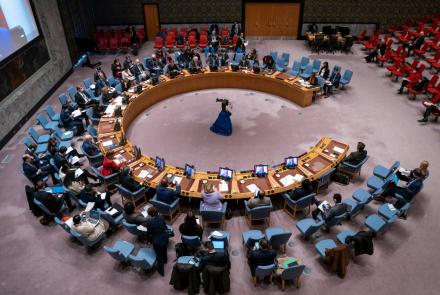Taliban Have Reverted to Exclusionary Policies of Late 1990s: UNSC

An annual report by the United Nations Analytical Support and Sanctions Monitoring Team for the UN Security Council Committee has criticized what it considers the return of the Islamic Emirate to “exclusionary” policies of the late 1990s.
According to the report, the threat of terrorism is rising in both Afghanistan and the region, and “there are indications that al-Qaida is rebuilding operational capability.”
“The Taliban, in power as the de facto authorities in Afghanistan under Hibatullah Akhundzada, have reverted to the exclusionary, Pashtun-centred, autocratic policies of the Taliban administration of the late 1990s,” the report reads.
The report says that after August 2022, the operations of Daesh’s Khorasan branch are becoming more sophisticated and lethal (if not more numerous) in Afghanistan.
“After so many years of war in Afghanistan, a national discourse is necessary for different political groups to come together and find a solution for the country’s future; otherwise, monopoly of power will remain,” said Torek Farhadi, a political affairs analyst.
“It is hard to judge the veracity of the matter, but if the Taliban don’t clarify this matter, the consequences of these words will return to the Taliban,” said Sayed Jawad Sajjadi, a university lecturer.
The UNSC report noted that the “Taliban have not delivered on the counter-terrorism provisions under the Agreement for Bringing Peace to Afghanistan between the United States of America and the Taliban.”
“The link between the Taliban and both Al-Qaida and the Tehrik-e-Taliban Pakistan (TTP) remains strong and symbiotic. A range of terrorist groups have greater freedom of maneuver under the Taliban’s de facto authorities. They are making good use of this, and the threat of terrorism is rising in both Afghanistan and the region,” the report reads.
“The Doha agreement was violated first by the Americans, and then the (Islamic) Emirate was not very committed to it. No doubt, the current Islamic Emirate has some flaws, but the international community was not committed regarding Afghanistan as it ought to have been,” said Mohammad Hassan Haqyar, a political affairs analyst.
“They should not discriminate and have a coherent and transparent fight against terrorism in general if they want to win the trust of the international community and Afghanistan,” said Asadullah Nadim, a military affairs analyst.
Meanwhile, Suhail Shaheen, the head of the Islamic Emirate’s political office in Doha, called the UNSC report away from the truth and said that all ethnic groups have a share in the current government.
Shaheen noted that no threat has been posed to any country from Afghanistan and that it will not happen in the future.
“We have always said that decisions and judgments about Afghanistan should not be based on the reports of some biased media in the world, but the reports about Afghanistan should be based on the ground realities and they should be corrected,” he said.
This comes as the Illicit drugs expert David Mansfield in a report last week citing satellite imagery, said that poppy cultivation in Afghanistan has been reduced to levels not seen since 2001 with cultivation in the south of the country down by at least 80% compared with last year, but in the UNSC report says that it is still too early to make a judgment about this.









